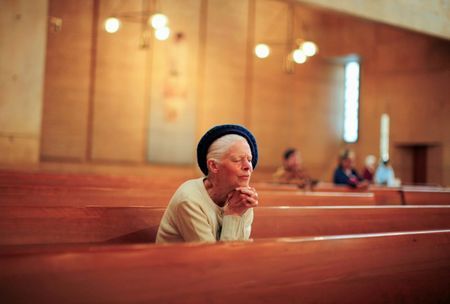-
Tips for becoming a good boxer - November 6, 2020
-
7 expert tips for making your hens night a memorable one - November 6, 2020
-
5 reasons to host your Christmas party on a cruise boat - November 6, 2020
-
What to do when you’re charged with a crime - November 6, 2020
-
Should you get one or multiple dogs? Here’s all you need to know - November 3, 2020
-
A Guide: How to Build Your Very Own Magic Mirror - February 14, 2019
-
Our Top Inspirational Baseball Stars - November 24, 2018
-
Five Tech Tools That Will Help You Turn Your Blog into a Business - November 24, 2018
-
How to Indulge on Vacation without Expanding Your Waist - November 9, 2018
-
5 Strategies for Businesses to Appeal to Today’s Increasingly Mobile-Crazed Customers - November 9, 2018
Active church involvement “adding months to older women’s lives”
Researchers assessed 74,534 women over the 10-year period from 1992 to 2012 and found that women who went to religious services a few times a week had as much as a 33 percent lower risk of dying.
Advertisement
Frequent attendees also had significantly lower risk from cardiovascular and cancer-related mortality, finds the research, by Harvard Chan School of Public Health in Boston.
“The association between religious participation and mortality probably has more to do with religious practice and specifically, communal practice, like attending religious services, than with religious belief”, said study author Tyler VanderWeele.
And he added: “The data do not validate claims made about some of the positive benefits of specific religious experiences, claims made even by medical professionals”.
“Our study suggests that for health, the benefits outweigh the potentially negative effects”, such as guilt, anxiety or intolerance, VanderWeele said.
Researchers used data from the Nurses’ Health Study in the analysis published in JAMA Internal Medicine. However, the authors note that a randomized clinical trial of attendance at religious services is neither ethical nor feasible.
During the 20-year study period, more than 13,500 women died.
Researches attributed the mortality disparity to cardiovascular disease, from which church-going women were 27 percent less likely to have died, and cancer, from which church-going women were 21 percent less likely to have died.
Almost two-thirds of Americans say that religion is an important part of their lives. Researchers adjusted for wide variety of factors, including their smoking and alcohol habits, race, body mass index, physical activity and more, to ensure reverse-causation wasn’t at play.
VanderWeele said the lower risks of dying from breast cancer among women who regularly attend church surprised them at first. Researchers said one reason those women lived longer is that going to church could promote self-discipline and give them a goal in life. In an accompanying editorial, Duke university psychiatrist Dr. Dan German Blazer writes: “We have no assurance that attendance at religious services is a marker of the strength of one’s religion or spirituality and no description of the extent of private practices of spirituality, such as prayer, or perceptions of spiritual well-being among the participants”.
Advertisement
The ladies that the study followed were either Catholic or Protestant.





























